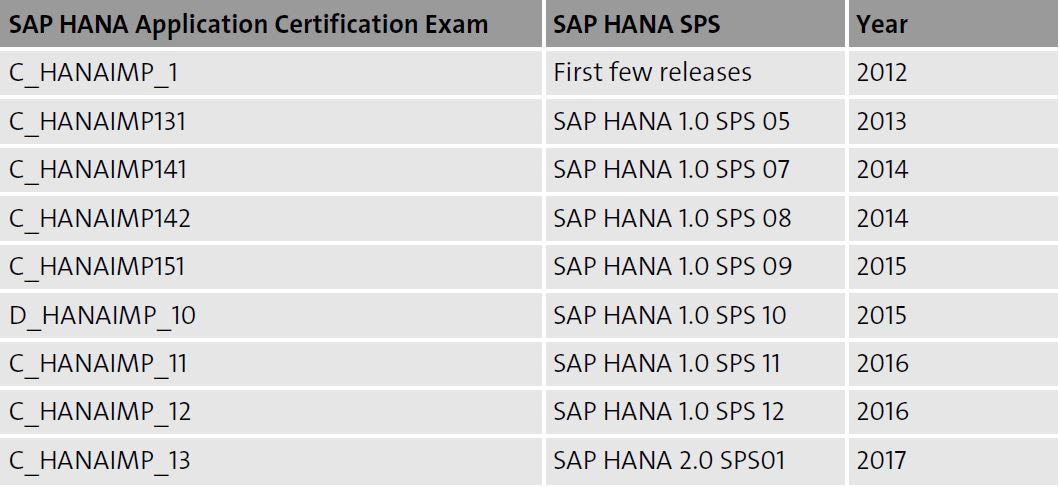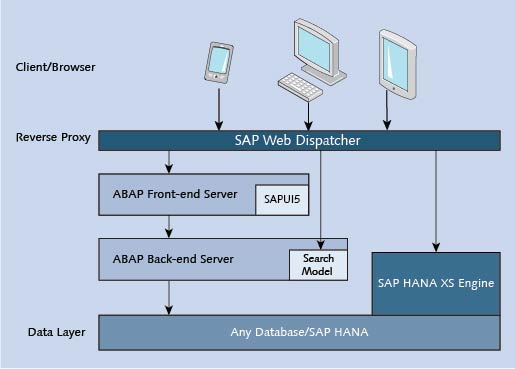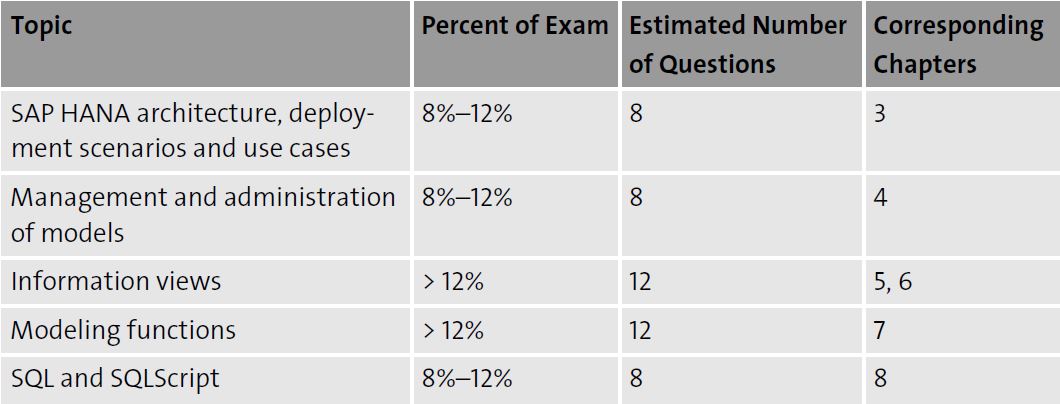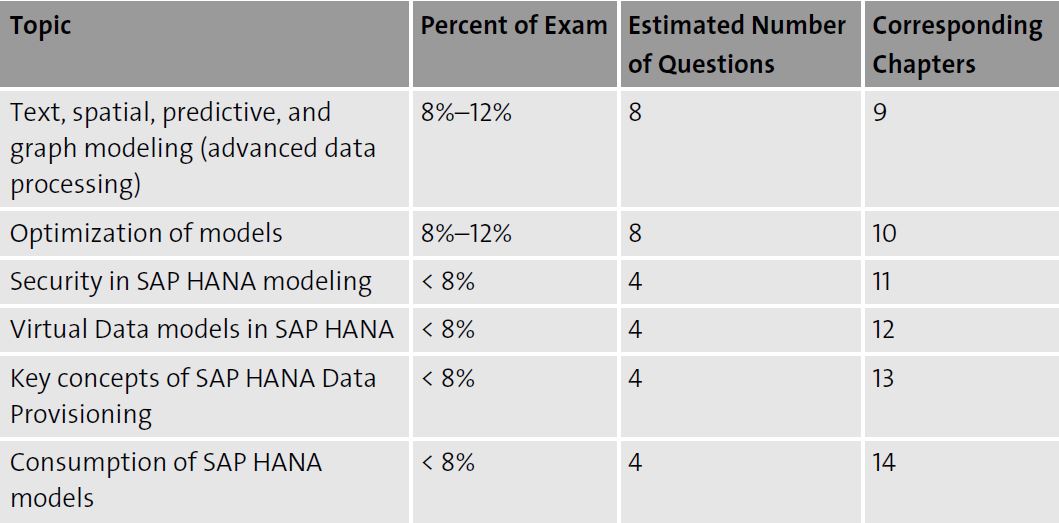In this blog post, we’ll focus on the objective and structure of the latest SAP HANA Application Associate Certification exam (C_HANAIMP) for SAP HANA.
SAP is evolving fast and is constantly being updated. Originally, a new major Support Package Stack (SPS) update of SAP HANA was released twice a year, requiring SAP Education to update all training materials and certification exams every six months. Fortunately, SAP changed this to one release per year, so all SAP certifications remain valid for the past two versions.
In other words, your SAP HANA certification, depending on when you received it, will be valid for one and a half to two years. This is regrettably a slightly shorter time frame than for most other SAP certifications, some of which can remain valid for many years. In a sense, this is the cost of working in such a fast-moving environment.
Exam Names
The different exam names for the SAP Certified Application Associate – SAP HANA certification (C_HANAIMP) can be seen in the following table. Note that the name has changed a few times over the years.

You’ll notice that the C_HANAIMP_1 certification exam included _1 at the end of the name, showing that it was the first certification exam. Over time, SAP started including the year in the certification exam name—for example, C_HANAIMP151. The first two numbers of 151 refer to the year, 2015, and the last number, 1, refers to the first half of the year. In this case, this combination corresponds to SPS 09.
In 2015, the naming convention was updated to refer directly to the SAP HANA SPS number. That is, the SPS 12 exam was called C_HANAIMP_12 instead of C_HANAIMP162. The _12 suffix indicates SPS 12.
With the new SAP HANA 2.0 releases, the numbering continues on from 12. The third one for SAP HANA 2.0, for example, was called C_HANAIMP_15. SAP Education delivered delta exams for SAP HANA, which will make it easier to extend the life of your SAP HANA certification. The D prefix in the table above indicates a delta certification exam. You needed to have passed the C_HANAIMP151 certification exam before you could take the D_HANAIMP_10 delta exam.
Tip: The SPS version for the on-premise version of SAP HANA differs from that of the cloud version. We’re referencing on-premise version SAP HANA 2.0 SPS 03. The corresponding version on SAP Cloud Platform is SAP HANA 2.0 SPS 04.
Now that we’ve introduced the SAP Certified Application Associate – SAP HANA certification, the next section will look at the exam as a whole: its objective, structure, and general process.
Exam Objective
As you can see below, the official name of the certification examination is shown in all uppercase letters as C_HANAIMP_16. On the left, you can see that the Level is Associate.
On the right side, you can see that the exam has 80 questions. The Cut Score in this example page is 64%, which means that you need to get 64% in this certification examination to pass. The Duration of the exam is 180 mins. The exam is available in English and Korean.

Note that there used to be a PDF link for sample questions. This has now been replaced by a sample exam that uses the actual exam system you’ll use when writing the exam. Just click on View more next to Sample Questions to open the sample exam. In this case, there are 10 sample questions you can look at to get an idea of what the actual examination questions look like. We normally recommend that you keep the sample questions in reserve for later; don’t dive in right away. You can use the sample questions to judge whether or not you’re ready for the certification examination.
Tip: As a general rule, if you say “Huh?” when you look at the sample questions, then you’re not yet ready for the exam.
The examination itself is focused on certain tasks.
Exam Structure
When you scroll down through the web page shown above, you’ll see how the exam is structured and scored. Each of the topic areas are mentioned there, as well as the percentage that each area contributes toward your final score in the certification exam.
The first area is Text Processing and Predictive Modeling. When you expand this area, you can see that the HA300 training course is available for studying the content required to answer questions on this topic. More than 12% (actually about 15%) of the questions fall into the Text Processing and Predictive Modeling topic, which means that there are roughly 12 questions in the certification exam on this topic.
The second area is Building calculation views. When you expand this area, you can see that the HA300 training course is available. More than 12% of the questions fall into the Building calculation views, which means that there are roughly 12 questions in the certification exam on this topic.
The fourth area, Technology, architecture and deployment scenarios of SAP HANA, is roughly 10% (between 8% and 12%) of the exam, meaning that it covers about eight questions. The HA100 training course is available for more information on this topic. Other portions of the exam follow this same percentage determination and provide short descriptions.
As you can see, SAP recommends three training courses: HA100, HA300, and HA301.
The following table lists the different topic areas you need to study for the C_HANAIMP_16 certification exam, along with the weighted percentage for each section and the estimated number of questions.


Exam Process
You can book the certification exam you want to take at http://s-prs.co/v487606. You can see a list of available certification exams at http://s-prs.co/v487607.
On the SAP Training website (https://training.sap.com/), choose the country you live in or the country that you want to take the exam in. You can also choose to write the exam in the cloud, using the Certification Hub subscription. The price of the certification exam and available dates will appear in the right column on the web page. Currently, the SAP HANA certification exams are also still administered in SAP examination centers even though the exam is an online exam.
Note: New certification exams, such as C_HANAIMP_16, are administered in the cloud. Cloud certifications use remote proctoring, in which an exam proctor watches you (the test taker) remotely via your computer’s webcam. You have to show the proctor the entire room before the exam begins by moving your webcam or your computer around. These test proctors have been trained to identify possible cheating.
When you arrive for the exam, you’ll need a form of identification. During your certification exam, you won’t have access to online materials, books, your mobile phone, or the Internet.
As you mark answer options, the answers are immediately stored on a server to ensure that you don’t lose any work. When you finish all your certification exam questions and submit the entire exam, you receive the results immediately. If you don’t pass the certification exam, you can take it up to two more times.
Normally, you’ll receive the printed certificate about a week later at your examination center, or you can receive it by mail. You can also see your certificate in the Acclaim portal. You can find more information on how to register yourself at their website at https://www.youracclaim.com/. The Acclaim platform is used by several large companies to manage people’s certifications. Your certification status will be shown here, and it allows potential customers or employers to verify your certifications. The Acclaim portal also allows you to share your SAP Global Certification digital badges on major social networks like Facebook and LinkedIn. You can share and promote all your certifications from SAP and other companies to give the ecosystem a comprehensive overview of all your skills.
Conclusion
You should now understand the various SAP HANA certification examinations and be able to identify which exam is right for you. You know about the scoring structure of C_HANAIMP_16, so you can focus your study time and energy accordingly. Best wishes on your exam.
This content was originally posted on the SAP PRESS Blog and has been adapted from a section of the book SAP HANA 2.0 Certification Guide: Application Associate Exam by Rudi de Louw. Used with permission of SAP PRESS. All rights reserved.
